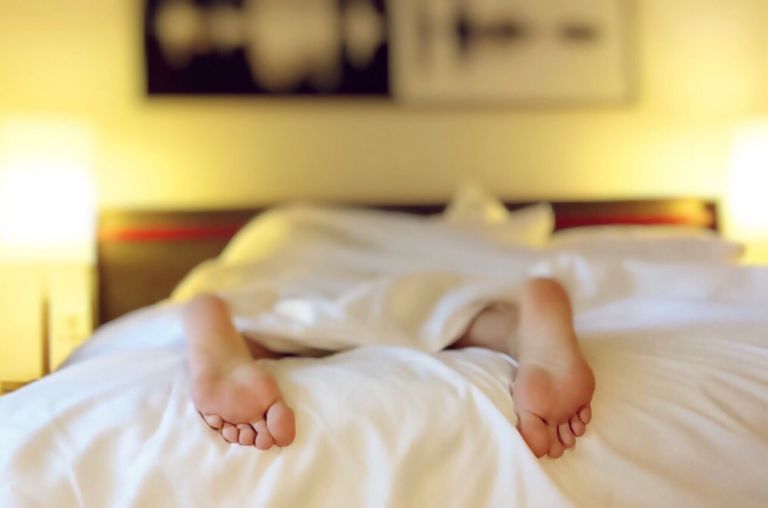Sleep is critical for many aspects of our health; cardiovascular, mood, immune functioning, cognitive health, metabolism, the list goes on. The general recommendation is for adults to get 7-8 hours of sleep and for children, upwards of 11 hours per night. Most realize they should be getting a good night’s sleep, however, this has become increasingly elusive in our modern society. Here are 7 tips for healthier sleep.
Tip 1: Get Plenty of Bright Light During the Day
This can be difficult, I know. However, ensuring that you’re getting adequate bright light during the day is vital for your sleep, and overall health. Humans have evolved to be in rhythm with our natural cycles of light and dark. When we don’t get enough bright sunlight during the day and extend our lighting hours far past sundown, we confuse our body’s circadian rhythm (daily cycles within the body). This suppresses our melatonin production, negatively affecting multiple aspects of our body, including our ability to sleep optimally. Getting outside on a sunny day is the best way to get a solid dose of bright light. Light levels are measured in lux, and on a sunny day outside you can get lux levels of 100,000. In homes it is typically 50-100 lux, and 100-500 lux in offices.
Tip 2: Enjoy the Morning Sun
Getting out into sunlight, especially during the morning, is a great way to balance your circadian rhythm. Ideally you would get roughly 30 minutes of sunlight, aiming for the 8AM – 10AM range. Exposing yourself to the morning sun without glasses, contacts or a hat, so you can get the full spectrum of light, is extremely beneficial. Light through a window is not the same, as it filters out portions of the UV, altering the messages your body receives.
Another great strategy is using your time outside to repeat an affirmation or two. Something along the lines of, “I am having a deep, restful and fantastic sleep tonight. I am waking up feeling refreshed and healthy. Thank you.” This can be a further tool in your journey towards healthier and more satisfying sleep.
Tip 3: Limit Artificial Light at Night
Limiting the amount of artificial light after sundown is the flip side of the equation. Blue light reduction is of particular importance. Sources of blue light in the home are screens and most LED bulbs. Starting 2 – 3 hours before bed, begin limiting blue light exposure. On your computer you can use a blue light reduction app (Iris is a good one) and there are options for your phone (this is a good iPhone trick). Opting for incandescent bulbs and avoiding LED’s (especially the bright white ones) where you spend time at night is critical. Wearing orange, blue-blocking glasses is a great way to significantly lower your blue light exposure (Example 1, Example 2). Ensure that your bedroom is as dark as possible, use blackout blinds and cut out as much artificial light as you can. If you are using nightlights, make them as dim as possible and ideally they would be red light, as this wavelength of light is least disruptive to our circadian rhythm and melatonin production.
“Opting for incandescent bulbs and avoiding LED’s (especially the bright white ones) where you spend time at night is critical.“
Tip 4: Assess Bedroom EMF Levels
Assessing the EMF (electromagnetic field) exposures in your bedroom is an important component in seeking a healthier bedroom. Common sources of elevated EMF levels in the bedroom can include:
- Appliances and building wiring
- Baby monitors
- High voltage transmission & power lines
- Wi-Fi Router
- Inverters from solar panels
- Lightning
- Mobile phone towers
- Phones (Mobile and Cordless)
- Smart meters
- Wireless technology
A proper EMF assessment requires training and specific instrumentation, consulting a Building Biologist in your area is a great option. However, there are many steps anyone can take to limit their exposures, especially at night:
- Switch your phone to airplane mode while you sleep and keep it a good distance away from you.
- Move your bedside clock 6-8 feet away (these are high magnetic field emitters). Better yet, opt for a battery powered clock.
- Unplug lamps and anything else electrical within close proximity of your bed. Ideally, turning off the breakers that supply power to your walls, floor and ceiling that are within a 6-8 foot radius of your bed (this cuts down on electric fields and body voltage).
- Turning off your Wi-Fi at night is important. You can connect your router to a timer switch so that you don’t have to think about it. Or better yet, switch to wired connections (see here for more information on wired options).
- Picking up a basic meter and testing your environment is really the best way to see where you’re at. Every room is different. I recommend this online store for meters, great customer service.
Tip 5: Essential Oils
Using essential oils can be an effective and enjoyable way to increase the quality of your sleep. There are many different oils out there and different ways of using them. When choosing an oil, it is best to use your nose and see what resonates with you. This isn’t always feasible with online shopping, so here is a list of essential oils commonly used for healthier sleep:
- Lavender
- Sandalwood
- Rose-Geranium
- Jasmine
- Ylang Ylang
- Sweet Marjoram
- Clary Sage
- Vanilla
There are multiple ways to reap the benefits of essential oils. One of the easiest is to diffuse them. For this you will need an essential oil diffuser. be sure to get one big enough for the room you’re using it in. Putting one in the hallway outside the bedrooms, and turning it on right before bed, is a great strategy.
Diffuser blends for sleep
- Roman chamomile, lavender and vetiver.
- Frankincense, myrrh, and vetiver
- Cedarwood, sandalwood, and valerian
You can also put 4-5 drops on a cotton ball and keep that near your pillow as you’re falling asleep. Lavender and rosemary are nice for this. Or any of the oils above. Enjoy an essential oil soak roughly 90 minutes before bed. Using any of the oils listed above, put a few drops in your bath water. Including some Epsom salt is another great addition to a before-bed soak. The magnesium in the Epsom salt relaxes and soothes the body, absorbing in through the skin.
Tip 6: Sleep Affirmations
Repeating positive-sleep affirmations before going to bed can be very helpful tool. (More info on creating affirmations). Any “I am” statement that involves you sleeping well is effective. An example would be, “I am having a deep, restful and fantastic sleep tonight. I am waking up feeling refreshed and healthy. Thank you.” Affirmations are best if you make them your own and ensure they feel good to say.
Paying attention to the thoughts you’re having right before you fall asleep is something often overlooked. The thoughts you dwell on before you sleep are what you marinate in and infuse into your subconscious. Focusing on what you’re grateful for in your life is useful, or just trying to focus on your breathing, gently pushing thoughts away. Mentally saying a word on your in-breaths and out-breaths, such as “healthy” when breathing in and “sleep” when breathing out, can also work. You can choose any words that resonate with you. “I am,” statements work nicely for this too.
“The thoughts you dwell on before you sleep are what you marinate in and infuse into your subconscious.“
Tip 7: Consistent Sleep and Wake Times
The time we go to sleep and wake up each day impacts our circadian rhythm. If we fall asleep at a similar time (ideally not much later than 10 PM), and wake up around the same time every day, our circadian rhythm is reinforced and strengthened. This improves the quality of our sleep and the ease with which we get there.
Our circadian rhythms play a large role in our overall health, affecting our mental health, and increasing risk factors for diabetes and cancer, to name a few. A new 2020 study out of Notre Dame University sheds more light on this, and how inconsistency in your bedtime can negatively affect your cardiovascular health.
The health of our sleep plays a huge role in our lives. When the quality of our sleep suffers, so do most other areas of our life. When working towards a healthier lifestyle, sleep is of paramount importance. Implementing these 7 sleep strategies will help you in your journey towards healthier and more nurturing sleep.


